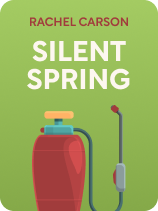

This article is an excerpt from the Shortform book guide to "Silent Spring" by Rachel Carson. Shortform has the world's best summaries and analyses of books you should be reading.
Like this article? Sign up for a free trial here.
What are the disadvantages of pesticides? Why wasn’t the public properly informed about pesticides in the 20th century?
Much of Silent Spring is dedicated to describing the damage done by pesticides to various species. Many pesticides have been linked to cancer, nerve damage, blood diseases, impaired thyroid function, and birth defects.
Check out why biologist Rachel Carson worries about the use of pesticides.
1. Cross-Contamination of Pesticides
While pesticides are already deadly in the lab, Carson argues that one of the disadvantages of pesticides is that they become deadlier once applied to an environment, where they spread far beyond a targeted area through soil, water, and the food chain. Spraying can wipe out communities of larger animals while leaving insects and plants untouched due to biomagnification, the process in which a substance becomes increasingly concentrated and thus toxic as it moves up the food chain. For example, spraying against the Clear Lake gnat ultimately killed large numbers of western grebes—the birds fed on the fish, which in turn fed on the gnat. Humans’ high position on the food chain makes them similarly vulnerable to contaminated meat, fruits, and vegetables.
(Shortform note: The population of western grebes on Clear Lake eventually recovered from the spraying, though today they are threatened by the effects of climate change. Both animals and humans are vulnerable to biomagnification not just of pesticides, but of toxic metals like mercury or lead and “forever chemicals” like PFAS, which can remain in an environment—or a living body—for years without breaking down. PFAS are used to create fire-suppressing foam and water-resistant fabrics and have been linked to various cancers. Evidence suggests that, like pesticides, they can impair thyroid functioning and fertility.)
Carson explains that aside from pesticides’ impact on animals directly, they can also poison the soil and water that make up an environment. In sprayed soil, roots don’t reach as deep, insect activity no longer aerates the dirt, and the nitrification process is interrupted. Plants grown there often contain pesticides, even if they were planted years after the spraying. Water sprayed may become unsafe to drink, and different chemicals can combine in lakes or ponds to form even deadlier pesticides—for example, 2,4-D has been found in waterways that were never sprayed. Though pesticides break down more quickly in water than in soil, they can still linger for years, and repeated spraying makes full environmental recovery impossible.
(Shortform note: Other threats to soil health include climate change, intensive farming, and deforestation. As of the 21st century, an estimated one-third of the Earth’s soil is “degraded,” or unable to support life, often as a direct result of human activity. Similarly, the world’s water supply is threatened by rising temperatures and pollution to the extent that the UN predicts worldwide water shortages by mid-century. Pesticides remain a threat as well, as agriculture is a major source of pollution.)
2. Specific Effects of Pesticides
Common effects of pesticide spraying on insects, animals, and humans can include nerve damage and convulsions, vomiting, diarrhea, fever, difficulty breathing, and mass death. Though pesticides have yet to devastate human populations the way they have insects, birds, fish, small mammals, and livestock, Carson gives multiple examples of government-sponsored spraying campaigns that resulted in hospitalizations. The 1959 spraying of aldrin over parts of Michigan and the 1954 and 1960 spraying of dieldrin in Illinois both sickened people and killed large numbers of birds, cats, rabbits, and squirrels, despite federal and local Agriculture Departments’ insistence that the chemicals were safe.
Beyond the documented reactions to pesticides, Carson argues that there’s evidence pesticides can sterilize humans, cause genetic damage, and increase the risk of cancer. She also warns that pesticides may have additional harmful effects that won’t become apparent for years to come.
3. Public Ignorance About Pesticides
Carson argues that people are vulnerable to pesticides not just because the chemicals are dangerous but also because chemical companies and governments have done little to educate the public about the danger. Studies have shown that most Americans are ignorant of pesticides’ ability to poison or cause disease, even as they use them in their homes and gardens—resulting in hospitalizations when people inadvertently contaminate their own water supply or fill an enclosed room with deadly chemicals. Local agriculture departments often downplay or outright lie about the dangers of spraying campaigns carried out over residential areas, and some have been sued after the fact by farmers whose product was destroyed.
Since chemical companies have no incentive to warn about the dangers of their products, Carson believes that the best solution is more government oversight. The Food and Drug Administration is intended to protect public health by regulating commercial products, but their ability to control the spread of pesticides is limited by the small number of employees and the fact that many sprays are permitted to go to market even as they’re still being tested for carcinogenic or otherwise harmful effects. Carson argues that the department’s reach should be expanded, including allowing it to ban some pesticides outright, and that the federal government should do more to educate people about the uses and dangers of pesticides.

———End of Preview———
Like what you just read? Read the rest of the world's best book summary and analysis of Rachel Carson's "Silent Spring" at Shortform.
Here's what you'll find in our full Silent Spring summary:
- How pesticides threaten to devastate the environment and poison humans
- Why there should be stricter regulation of pesticides in the US
- How this 1962 book inspired the environmentalist movement of the 70s






